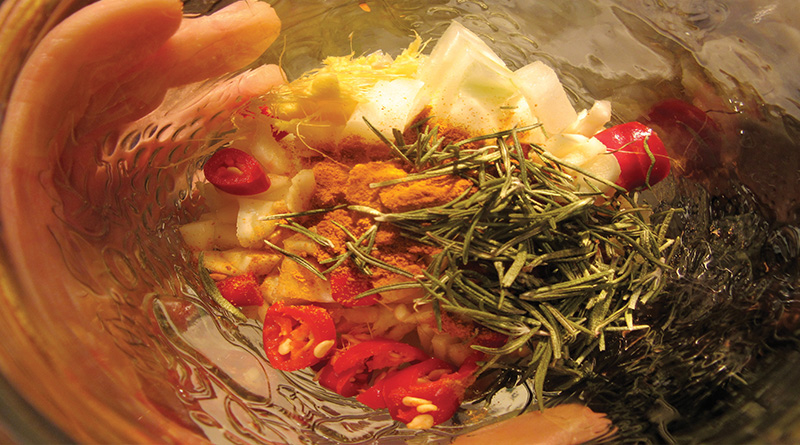Rosemary’s Fire Cider
By Forest Grace
Hippocrates said, “ Let food be thy medicine and medicine be thy food. “ To me, this statement is the epitome of what Rosemary’s Fire Cider represents. It’s where culinary and remedy reside – melding hot, spicy, pungent and sweet – all in one place!
With it’s warming, immuno-stimulating, anti-bacterial, anti-viral and circulatory-enhancing ingredients, late autumn is the perfect time to prepare it; ready just in time for the cold months ahead.
I first discovered Fire Cider during my Practical Herbalism correspondence program with renowned Herbalist, Rosemary Gladstar who has been sharing and preparing this recipe, each winter season for upwards of 25 years.
Fire Cider is a traditional remedy with deep roots in folk medicine. The base ingredients are standard and consist of apple cider vinegar, horseradish, onion, garlic, ginger, cayenne pepper (or other hot peppers). In addition to these, you can use various herbs, making it to your own preference. So let’s get started!
ROSEMARY’S FIRE CIDER
Whenever possible use organic ingredients. This concoction will be macerating in unpasteurized organic apple cider vinegar for at least four weeks. For the quantity of ingredients listed, you will need a clean/sterilized one-quart canning jar with plastic lid.
If you do not have a plastic lid, the two-part metal lid can be used with a piece of parchment in between the lid and the mouth of the jar. Apple cider vinegar has the ability to corrode metal over time. This year, I decided to use the recipe on the Mountain Rose Herb blog as a guide for quantity of ingredients, with a few tweaks of my own.
You can tweak it too! Use the juice and rind of a lemon or orange – maybe you prefer sage or thyme over rosemary, perhaps you would rather have rosehips to turmeric. Here’s what I did: Ingredients
- 1/2 cup fresh grated organic horseradish root
- 1/2 cup fresh grated organic ginger root
- 1 medium (or larger) organic onion , chopped
- 10 large cloves of organic garlic, chopped or crushed
- 1 organic cayenne pepper, chopped
- 1/4 tsp organic cayenne pepper powder
- Several sprigs of fresh organic rosemary or 2 Tbsp dried rosemary leaves
- 1 Tbsp. organic turmeric powder
- Unpasteurized organic apple cider vinegar
- Unpasteurized honey to taste (this is added after straining)
Unpasteurized honey should not be given to children under the age of one.
Directions
Clean and prepare all of your roots and herbs and place them in the quart-sized jar. Fill the jar with as much unpasteurized apple cider vinegar to top the jar, but leaving about an inch or so from the top as the jar will be shaken. If you are using the two-part canning lid, place a piece of parchment paper between the lid and the opening of the jar.
Give it a good shake and store in a cool, dark place for four weeks. Label your jar with the ingredients, date of preparation and date to be decanted. Shake the jar everyday! At the end of the four weeks, strain out the ingredients over a large measuring cup, using a cheesecloth-lined strainer, and squeeze/press out all the liquid that you can from the pulp. Add 1/4 cup of honey to the liquid, stir well and taste.
If you would like it sweeter, then add more honey to reach your desired sweetness. Pour into a clean/sterilized bottle and remember if you’re not using a plastic lid to use parchment between the lid and the opening of the bottle. I keep mine in the fridge and the shelf life is four to five months. When to Use (always try a small amount first to see how your body responds)
Culinary: Use for salad dressing, add to soups, drizzle on vegetable dishes, add to a beverage such as tomato juice or applicable cocktail, mix with hot water and honey to make a warming tea.
Remedy: Take a small amount as tonic to help boost immunity, sore throat (gargle and swallow), sinus congestion and cough/cold congestion (take 1 Tbsp at the first sign of a cold and then repeat every three to four hours until symptoms subside), to help move a sluggish digestive tract.
Forest Grace is an Herbalist-in-Study through renowned Herbalist, Rosemary Gladstar’s Practical Herbalism Programme (under the guidance of Shantree Kacera, D.N., PhD. of The Living Centre in London, Ontario).
Living in the forest in the West Nipissing District for the last seven years has given her the opportunity to expand her knowledge first-hand with the plants and trees that are natural to the Boreal Forest. She is keenly interested in botany and preserving wildlife and their habitats.




